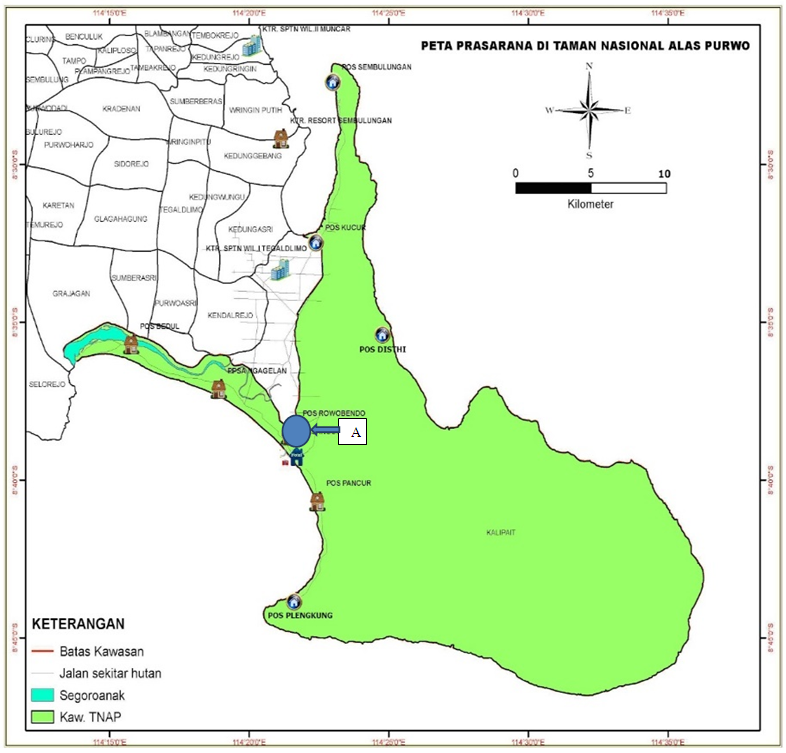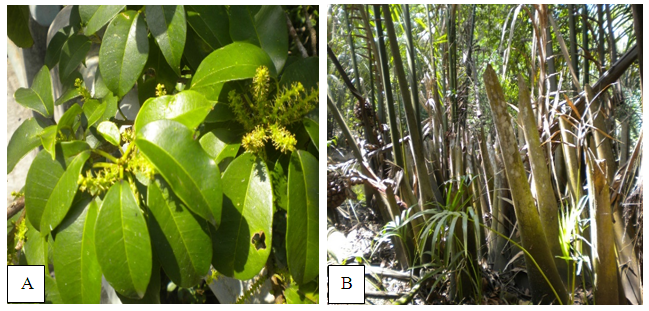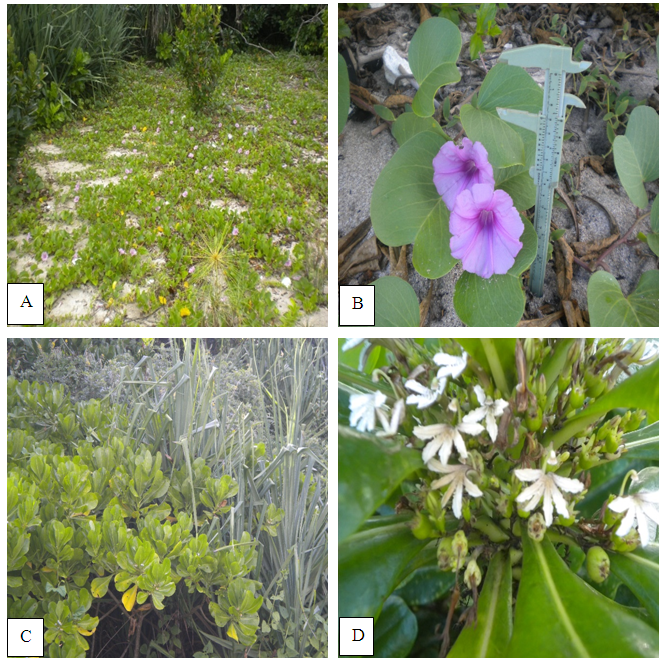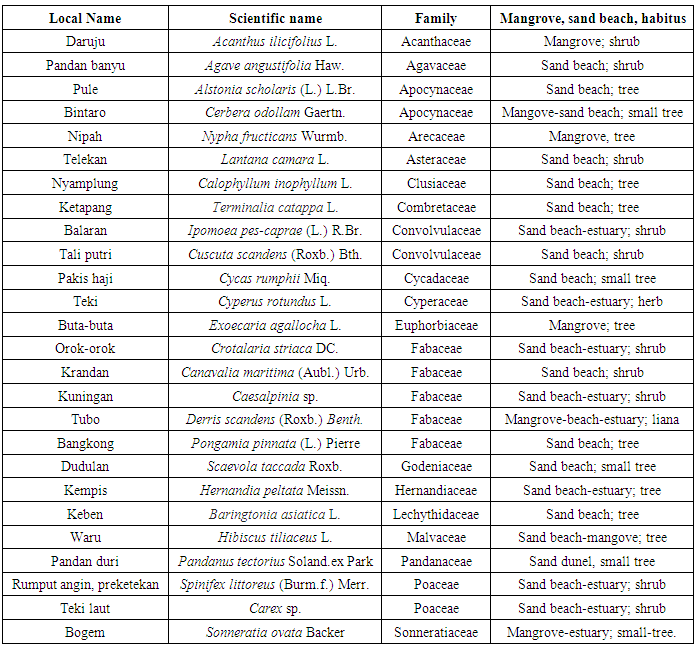-
Paper Information
- Paper Submission
-
Journal Information
- About This Journal
- Editorial Board
- Current Issue
- Archive
- Author Guidelines
- Contact Us
International Journal of Agriculture and Forestry
p-ISSN: 2165-882X e-ISSN: 2165-8846
2018; 8(4): 139-143
doi:10.5923/j.ijaf.20180804.01

Survey Study Greenbelt Species of Natural Triangulasi Alas Purwo National Park (TN-AP) Banyuwangi Regency, East Java, Indonesia
Jati Batoro1, Rodiyati Azrianingsih1, Nia Kurniawan2
1Biology Department, Faculty of Mathematics and Natural Sciences, Brawijaya University, Indonesia
2Zoology Laboratory, Department of Biology, Faculty of Science, Brawijaya University, Indonesia
Correspondence to: Jati Batoro, Biology Department, Faculty of Mathematics and Natural Sciences, Brawijaya University, Indonesia.
| Email: |  |
Copyright © 2018 The Author(s). Published by Scientific & Academic Publishing.
This work is licensed under the Creative Commons Attribution International License (CC BY).
http://creativecommons.org/licenses/by/4.0/

The purpose of this study is to reveal the diversity of natural forest flora species of mangrove beach and sand beaches in Triangulasi National Park Alas Purwo (TN-AP) in Banyuwangi, East Java. Mangrove and and sand beach forest green belt as disaster mitigation of sea level rise in coastal zones. The foremost species of magrove forest and natural sand beaches as an indication of the existence and conservation of its diversity. This research is expected to provide scientific information, evaluate ongoing development, especially in Trianggulasi area TN-AP. This research was conducted through survey and field identification. The results of the survey then in the collection, made herbarium, diagnosis and determined its scientific name. The results of a survey of natural greenbelt diversity in the Triangulasi area in 26 species belonging to 26 genera, and 19 families recorded. The benefit of this research is to know the structure of flora diversity in supporting the determination of the potential of the green-belt of Java's southern coastal forest. Conservation of natural ecosystems is important in these areas concerning the life of coastal ecology organisms. The natural forest ecosystem structure Triangulasi area can be used in the selection of greenbelt species and the development of attractive natural tourism destinations.
Keywords: Tropical coastal areas, Green-belt, Triangulasi, Alas Purwo National Park (TN-AP), East Java
Cite this paper: Jati Batoro, Rodiyati Azrianingsih, Nia Kurniawan, Survey Study Greenbelt Species of Natural Triangulasi Alas Purwo National Park (TN-AP) Banyuwangi Regency, East Java, Indonesia, International Journal of Agriculture and Forestry, Vol. 8 No. 4, 2018, pp. 139-143. doi: 10.5923/j.ijaf.20180804.01.
Article Outline
1. Introduction
- Indonesian is an island with an approximately 17.508 islands and length of beaches approximately 81.000 km. Alas Purwo National Park (TN-AP) has an area of 43.420 ha with a height of 1-322 m ASL. [1]. There are very large biotic and abiotic in coastal resources. The Mangrove Alas Purwo National Park (AP-NP), Banyuwangi regency is one of the most dynamic special in South Java island. Biodiversity TN-AP recorded 580 species of flora and 50 species of fauna with more than 5 ecosystems including mangroves, sand beaches, grasslands, bamboo forests, etc. [1] reported more than 31 species of mammals, e.g. bull or banteng jawa (Bos javanicus), deer or rusa (Cervus timorensis), wild dog or ajag (Cuon alpinus), hog or babi hutan (Sus scrofa), deer or rusa (Muntiacus muntjak), leopard or macan tutul (Panthera pardus), javan lutung or lutung (Trachypithecus auratus), long-tailed macaque or monyet kera (Macaca fascicularis) and large lizard or biawak (Varanus salvator).Magrove ecosystems are found in intertidal areas where deposition of sediment occurs. The are dominated by trees, shrub, herb, liana, epiphyte, saprophyte and associated organisms occupying environment at the land or sea. Conservation of mangrove ecosystems is especially important for archipelagic areas. Thus, the mangrove ecosystem has many functions to holding strong winds, tsunami, strom and hydrological forces and coastal erosion [14]. [11] reported magrove diversity in Papua New Guinea more than 37 species. In the other hand over 50 plant species found in mangrove vegetation in Thailand [3]. One of the most important coastal natural resources is forests mangroves. Mangrove forest ecosystems have enormous functions for human life, both physical, ecological and economic [11]. [5] reported sand dune diversity in Glagah resulted in identification of 84 plants. pandan ri (Pandanus tectorius), balaran (Ipomoea pescaprae), krandan (Canavalia maritima), biduri, widuri (Calotropis gigantea), teki laut (Carex sp.), preketekan (Spinifex littorius), is special well growth in sand beach. Krandan (Canavalia maritima), rumput angin or preketekan (Spinifex littorius), pandan ri (Pandanus tectorius) are very important to protect the beach and coastal dunes, as well as for the protection of coastal infrastructure. Parangtritis beach adjacent to the epicenter of the quake zone from both tectonic faults from Opak sesar and Indoaustralia-euroasia plate stretching in the southern island of Java [7]. While Triangulasi has a coastline similar to Parangtritis Yogyakarta on the southern coast of Java. The obyectives of this risearch reveal the condition of the mangrove and sand-beach ecosystem biodiversity in Trianggulasi Alas Purwo National Park (AP-NP).
2. Materials and Methods
- This study was conducted through surveys and direct observations in Triangulasi of Alas Purwo National Park (AP-NP) region, in May 2017 and May-2018 (Fig 1). This research using with collecting the plant materials, drying, mounting, preparation and preservation of plant specimens [4, 8. 9]. The identification and nomenclature of the listed plants were based on the Flora of Java and Flora Malesiana.
 | Figure 1. Map of Alas Purwo National Park (AP-NP) Banyuwangi Regency East Java (blue color). A. (Triangulasi) of study sites [2] |
3. Results and Discussion
- Information regarding their listed below starting with local name, scientific name and family name, location mangrove, sand beach and habitus (Table 1)
|
 | Figure 2. Magrove Triangulasi A. Exocaria agallocha B. Nypa fructicans Wurmb. (Photo:J.Batoro) |
 | Figure 3. Sand beach A.Distribution Ipomoe pescaprae, Pandanus tectorius, Spinifex littoreus B. Habitus Ipomoea pescaprae C. Pandanus tectorius D. Scaeveola taccada (Photo, J.Batoro) |
4. Conclusions
- Result description of the investigation forest Triangulasi Alas Purwo National Park (AP-NP), Banyuwangi include 26 species were recorded. Potential development of greenbelt species selected Triangulasi includes Canavalia maritima, Pandanus tectorius, Scaveola taccada, Calophyllum inophyllum, Baringtonia asiatica, Alstonia scholaris, Exocaria agallocha, Nypa fructicans, Cerbera odollam, Cycas rumphii, Hernandia peltata, Terminalia catappa, Hibiscus tiliaceus. Biodiversity conservation on Triangulasi area can reduce tsunami attack caused by earthquake. The natural forest ecosystem structure Triangulasi can be used in the selection of greenbelt species and the development of attractive natural tourism destinations.
5. Suggestion
- The results of this selected type of research can be used as a basis to undertake the effort to repair the area of greenbelt that was damaged in the tropical coastal areas.
ACKNOWLEDGEMENTS
- The author would like to express their gratitude to Deparment Biology FMIPA Brawijaya University for field practicum of Biology Students and FMIPA and DPP/SPP financial supports during our research mangrove and sand beach Triangulasi-National Alas Purwo National Park, East Java. The author thanks to Dean TN-AP and Mr. Kiswandi from LIPI, and also Mr. Purnomo M.Ling (Ecology laboratory), Mr. Arifin’s, curator MUBR for using specimen during this research.
 Abstract
Abstract Reference
Reference Full-Text PDF
Full-Text PDF Full-text HTML
Full-text HTML